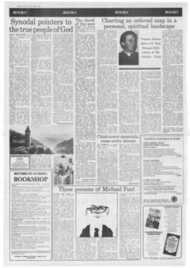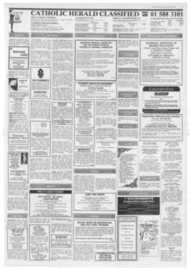Page 5, 21st March 1986
Page 5

Report an error
Noticed an error on this page?If you've noticed an error in this article please click here to report it.
Tags
Share
Related articles
`even Singing The Chant Badly Reflects Something...
The Cross, Symbol Of Christ's Supreme Triumph
"they That Sat In The Gate Were Busied Against Me;
In The Footsteps Of The Gospels
The Liturgy Of Holy Week
Holy Week: when the Church takes up the cross
THE CROSS that Jesus bore for us pervades our thoughts during this holiest of weeks. We can never quite forget it. Not on Palm Sunday when we join Christians of all times and places in chanting the triumphant greetings of Jerusalem's pilgrims and citizens, "Hosannah to the Son of David". Even with the words upon our lips we think of how this king will pronounce his regal pardon not from a dais but from a cross before the week is out.
Not even on Holy Thursday, as we recall the Passover feast, the sacred eucharistic meal that Jesus shared with his disciples and bade us to continue sharing as a thanksgiving for liberation, a memorial of his saving acts, and as a communion with him. Even with the joy of being together as his people on this night we think of his body given up for us and of this blood shed for us. The shadow of his cross falls over the paschal table.
Holy Week is the week of the cross as Christmas is the week of the crib. its message is love. He asks us to offer our difficulties to him. "Take up your cross and follow me." The cross of Christ is engraved in our hearts. We are signed with it when we are first brought to be his disciples. We are sealed with it when we are confirmed in his service. We begin our worship with this same sign of divine love.
It helps us in daily life. "Lord, it's difficult to admit that I'm not as young as I used to be. It's not so much the being old that is difficult to bear, rather it's the obsolescence, the growing out-of-date and unimportant. When you are young you thrash about with vital energy trying to make your mark on the world, but when you are old you are forced by your own tired body to sit quietly by, watching as others move up.
Let me be wise in my growing old, Lord, knowing that I have clone what I could and smiling with peace as another takes his turn in the game of life." We ask too for the gift of forgiveness. As we forgive others, so shall we be forgiven by Christ. We have all something of the prodigal son within us. Christianity is the only court in the world where the guilty man writes his own sentence. "Forgive us our sins as we forgive others who sin against us."
As we judge so shall we be judged. As we forgive others so, in reality, we forgive ourselves. One of the ironies of life is that we are often more ready to forgive a stranger than one who is close. Holding grudges is of death, while forgiveness is of life. Even when we have been unjustly wronged forgiveness is expected and gives us merit with God.
Christ stresses the importance of our dealings with others. At Mass when the priest holds up the host and says' "This is my Body," we respond in faith "Amen". But it goes further. Christ points to all those present saying, "This — these believing men, women and children — is my Body. Do you believe they are? Will you treat them specially as you do me?" Christ repeatedly stresses the importance of our dealings with others. We see the living Christ in living people. We try to build up a true love community.
If we don't we are not real Catholics at all. We are merely pleasant, or sometimes not so pleasant individuals meeting occasionally for Catholic ceremonies. Each time we receive Christ in Holy Communion we should strengthen our commitment to his family. We should fall more deeply in love with our fellow Christians. Scripture readings during Holy Week deal with three main points — penance to obtain forgiveness, thoughts on baptism, Christ's struggle against evil. They accentuate the transitory nature of our earthly life. We are called to continual conversion to Christ. We who have sinned need all the help we can get to recognise our sinfulness and have sincere sorrow for it. Christ wants us really to make up our minds to follow in the way He is leading — hating sin and loving God with all our heart and mind and strength. Fish on Friday has gone, but the real spirit remains — true conversion to Christ.
On Good Friday we venerate the cross of Christ. By His death on it we are saved, for He, the innocent one, stood for us and for all mankind. All the evil in us was epitomised by Adam. All the goodness was epitomised by Christ. The cross is a sign of hope.
It is the sign not of defeat but of victory. It is the sign of real love. Friday in Holy Week is the only one of the year that is called Good. It is the day on which our Lord and Saviour dragged a cross through an ancient city's streets and died upon it. It still hangs above us so that we shall never forget that God sees in us a goodness and value that we sometimes doubt. It is a week that gives us solemn reassurance that our lives are worthwhile. We don't know we're lovable until someone tells us. That is why Christ came into the world, and died for us, to assure us that we are very lovable indeed.
blog comments powered by Disqus











